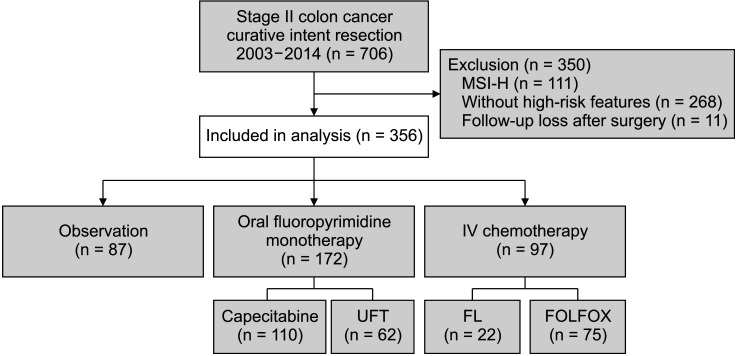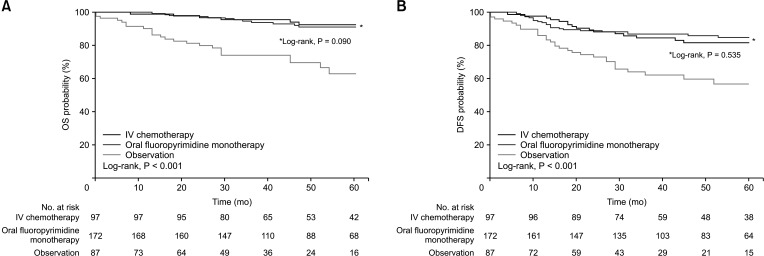Ann Surg Treat Res.
2022 May;102(5):271-280. 10.4174/astr.2022.102.5.271.
Effectiveness of oral fluoropyrimidine monotherapy as adjuvant chemotherapy for high-risk stage II colon cancer
- Affiliations
-
- 1Department of Surgery, Seoul National University Bundang Hospital, Seoul National University College of Medicine, Seongnam, Korea
- 2Department of Internal Medicine, Seoul National University Bundang Hospital, Seoul National University College of Medicine, Seongnam, Korea
- KMID: 2529681
- DOI: http://doi.org/10.4174/astr.2022.102.5.271
Abstract
- Purpose
The benefit of adjuvant chemotherapy for stage II colon cancer has not been clearly demonstrated even in cases with high-risk factors. This study aimed to compare the effectiveness of oral fluoropyrimidine monotherapy as adjuvant chemotherapy with that of intravenous fluoropyrimidine-based chemotherapy for high-risk stage II colon cancer.
Methods
This single-institution, retrospective study included patients who underwent curative resection for high-risk stage II colon cancer between 2003 and 2014. Patients were classified into 3 postoperative treatment groups: observation, oral fluoropyrimidine monotherapy group (OG), or intravenous fluoropyrimidine-based chemotherapy group (IVG).
Results
We identified 356 patients, including 87 (24.4%) in the observation group, 172 (48.3%) in the OG, and 97 (27.2%) in the IVG. Patients in the OG were older (63.8 ± 10.7 vs. 56.5 ± 10.8, P < 0.001) and had a lower number of T4 lesions (12.8% vs. 35.1%, P < 0.001) than those in the IVG. Regarding survival outcomes, the 5-year overall and disease-free survival rates were not different between the OG and IVG (91.2% vs. 92.6% [P = 0.090] and 85.1% vs. 81.9% [P = 0.535], respectively). In multivariate analysis, age over 70 years and no adjuvant chemotherapy were associated with poor overall survival and disease-free survival. Fewer chemotherapy-related adverse events of grade ≥3 were observed in the OG than in the IVG (12.2% vs. 34.0%, P < 0.001).
Conclusion
In high-risk stage II colon cancer, adjuvant oral fluoropyrimidine monotherapy can be an effective and convenient alternative to intravenous fluoropyrimidine-based chemotherapy as it has comparable oncological outcomes and reduced chemotherapy-related complications.
Figure
Cited by 1 articles
-
National cancer screening program for colorectal cancer in Korea
Seung Min Baik, Ryung-Ah Lee
Ann Surg Treat Res. 2023;105(6):333-340. doi: 10.4174/astr.2023.105.6.333.
Reference
-
1. Bray F, Ferlay J, Soerjomataram I, Siegel RL, Torre LA, Jemal A. Global cancer statistics 2018: GLOBOCAN estimates of incidence and mortality worldwide for 36 cancers in 185 countries. CA Cancer J Clin. 2018; 68:394–424. PMID: 30207593.2. Jung KW, Won YJ, Hong S, Kong HJ, Lee ES. Prediction of cancer incidence and mortality in Korea, 2020. Cancer Res Treat. 2020; 52:351–358. PMID: 32178488.3. Yothers G, O'Connell MJ, Allegra CJ, Kuebler JP, Colangelo LH, Petrelli NJ, et al. Oxaliplatin as adjuvant therapy for colon cancer: updated results of NSABP C-07 trial, including survival and subset analyses. J Clin Oncol. 2011; 29:3768–3774. PMID: 21859995.4. André T, de Gramont A, Vernerey D, Chibaudel B, Bonnetain F, Tijeras-Raballand A, et al. Adjuvant fluorouracil, leucovorin, and oxaliplatin in stage II to III colon cancer: updated 10-year survival and outcomes according to BRAF mutation and mismatch repair status of the MOSAIC study. J Clin Oncol. 2015; 33:4176–4187. PMID: 26527776.5. Wilkinson NW, Yothers G, Lopa S, Costantino JP, Petrelli NJ, Wolmark N. Long-term survival results of surgery alone versus surgery plus 5-fluorouracil and leucovorin for stage II and stage III colon cancer: pooled analysis of NSABP C-01 through C-05. A baseline from which to compare modern adjuvant trials. Ann Surg Oncol. 2010; 17:959–966. PMID: 20082144.6. Gray R, Barnwell J, McConkey C, Hills RK, Williams NS, et al. Quasar Collaborative Group. Adjuvant chemotherapy versus observation in patients with colorectal cancer: a randomised study. Lancet. 2007; 370:2020–2029. PMID: 18083404.7. National Comprehensive Cancer Network (NCCN). NCCN clinical practice guidelines in oncology [Internet]. Plymouth Meeting (PA): NCCN;c2021. cited 2021 Apr 28. Available from: https://www.nccn.org/professionals/physician_gls/pdf/colon.pdf .8. André T, Boni C, Navarro M, Tabernero J, Hickish T, Topham C, et al. Improved overall survival with oxaliplat in, fluorouracil, and leucovorin as adjuvant treatment in stage II or III colon cancer in the MOSAIC trial. J Clin Oncol. 2009; 27:3109–3116. PMID: 19451431.9. Kuebler JP, Wieand HS, O'Connell MJ, Smith RE, Colangelo LH, Yothers G, et al. Oxaliplatin combined with weekly bolus fluorouracil and leucovorin as surgical adjuvant chemotherapy for stage II and III colon cancer: results from NSABP C-07. J Clin Oncol. 2007; 25:2198–2204. PMID: 17470851.10. Raphael MJ, Fischer HD, Fung K, Austin PC, Anderson GM, Booth CM, et al. Neurotoxicity outcomes in a population-based cohort of elderly patients treated with adjuvant oxaliplatin for colorectal cancer. Clin Colorectal Cancer. 2017; 16:397–404. PMID: 28434884.11. Borner MM, Schoffski P, de Wit R, Caponigro F, Comella G, Sulkes A, et al. Patient preference and pharmacokinetics of oral modulated UFT versus intravenous fluorouracil and leucovorin: a randomised crossover trial in advanced colorectal cancer. Eur J Cancer. 2002; 38:349–358. PMID: 11818199.12. Twelves C, Wong A, Nowacki MP, Abt M, Burris H 3rd, Carrato A, et al. Capecitabine as adjuvant treatment for stage III colon cancer. N Engl J Med. 2005; 352:2696–2704. PMID: 15987918.13. Argilés G, Tabernero J, Labianca R, Hochhauser D, Salazar R, Iveson T, et al. Localised colon cancer: ESMO Clinical Practice Guidelines for diagnosis, treatment and follow-up. Ann Oncol. 2020; 31:1291–1305. PMID: 32702383.14. Cassidy J, Twelves C, Van Cutsem E, Hoff P, Bajetta E, Boyer M, et al. First-line oral capecitabine therapy in metastatic colorectal cancer: a favorable safety profile compared with intravenous 5-fluorouracil/leucovorin. Ann Oncol. 2002; 13:566–575. PMID: 12056707.15. André T, Boni C, Mounedji-Boudiaf L, Navarro M, Tabernero J, Hickish T, et al. Oxaliplatin, fluorouracil, and leucovorin as adjuvant treatment for colon cancer. N Engl J Med. 2004; 350:2343–2351. PMID: 15175436.16. Allegra CJ, Yothers G, O'Connell MJ, Sharif S, Petrelli NJ, Colangelo LH, et al. Phase III trial assessing bevacizumab in stages II and III carcinoma of the colon: results of NSABP protocol C-08. J Clin Oncol. 2011; 29:11–16. PMID: 20940184.17. Punt CJ, Buyse M, Köhne CH, Hohenberger P, Labianca R, Schmoll HJ, et al. Endpoints in adjuvant treatment trials: a systematic review of the literature in colon cancer and proposed definitions for future trials. J Natl Cancer Inst. 2007; 99:998–1003. PMID: 17596575.18. Division of Cancer Treatment & Diagnosis, National Cancer Institute. Adverse events/CTCAE [Internet]. Bethesda (MD): National Institutes of Health;c2019. cited 2019 Dec 12. Available from: https://ctep.cancer.gov/protocolDevelopment/electronic_applications/ctc.htm .19. Booth CM, Nanji S, Wei X, Peng Y, Biagi JJ, Hanna TP, et al. Adjuvant chemotherapy for stage II colon cancer: practice patterns and effectiveness in the general population. Clin Oncol (R Coll Radiol). 2017; 29:e29–e38. PMID: 27663601.20. Breugom AJ, Bastiaannet E, Boelens PG, Iversen LH, Martling A, Johansson R, et al. Adjuvant chemotherapy and relative survival of patients with stage II colon cancer: a EURECCA international comparison between the Netherlands, Denmark, Sweden, England, Ireland, Belgium, and Lithuania. Eur J Cancer. 2016; 63:110–117. PMID: 27299663.21. Schüller J, Cassidy J, Dumont E, Roos B, Durston S, Banken L, et al. Preferential activation of capecitabine in tumor following oral administration to colorectal cancer patients. Cancer Chemother Pharmacol. 2000; 45:291–297. PMID: 10755317.22. Schmoll HJ, Arnold D. Update on capecitabine in colorectal cancer. Oncologist. 2006; 11:1003–1009. PMID: 17030642.23. Heo YS, Chang HM, Kim TW, Ryu MH, Ahn JH, Kim SB, et al. Hand-foot syndrome in patients treated with capecitabine-containing combination chemotherapy. J Clin Pharmacol. 2004; 44:1166–1172. PMID: 15342618.24. Urakawa R, Tarutani M, Kubota K, Uejima E. Hand foot syndrome has the strongest impact on QOL in skin toxicities of chemotherapy. J Cancer. 2019; 10:4846–4851. PMID: 31598155.25. Yoshino T, Yamanaka T, Oki E, Kotaka M, Manaka D, Eto T, et al. Efficacy and long-term peripheral sensory neuropathy of 3 vs 6 months of oxaliplatin-based adjuvant chemotherapy for colon cancer: the ACHIEVE phase 3 randomized clinical trial. JAMA Oncol. 2019; 5:1574–1581. PMID: 31513248.26. Lieu C, Kennedy EB, Bergsland E, Berlin J, George TJ, Gill S, et al. Duration of oxaliplatin-containing adjuvant therapy for stage III colon cancer: ASCO clinical practice guideline. J Clin Oncol. 2019; 37:1436–1447. PMID: 30986117.27. Tournigand C, André T, Bonnetain F, Chibaudel B, Lledo G, Hickish T, et al. Adjuvant therapy with fluorouracil and oxaliplatin in stage II and elderly patients (between ages 70 and 75 years) with colon cancer: subgroup analyses of the Multicenter International Study of Oxaliplatin, Fluorouracil, and Leucovorin in the Adjuvant Treatment of Colon Cancer trial. J Clin Oncol. 2012; 30:3353–3360. PMID: 22915656.
- Full Text Links
- Actions
-
Cited
- CITED
-
- Close
- Share
- Similar articles
-
- Adjuvant Chemotherapy in Colon Cancer
- The efficacy of chemotherapy in the patients with stage II colon cancer associated with number of high-risk factors
- Adjuvant chemotherapy for patients with stage II high-risk and III colon cancer: Hindering factors to adherence and impact on long-term survival
- Adjuvant Chemotherapy Using the FOLFOX Regimen in Colon Cancer
- Oncologic outcomes of early adjuvant chemotherapy initiation in patients with stage III colon cancer




